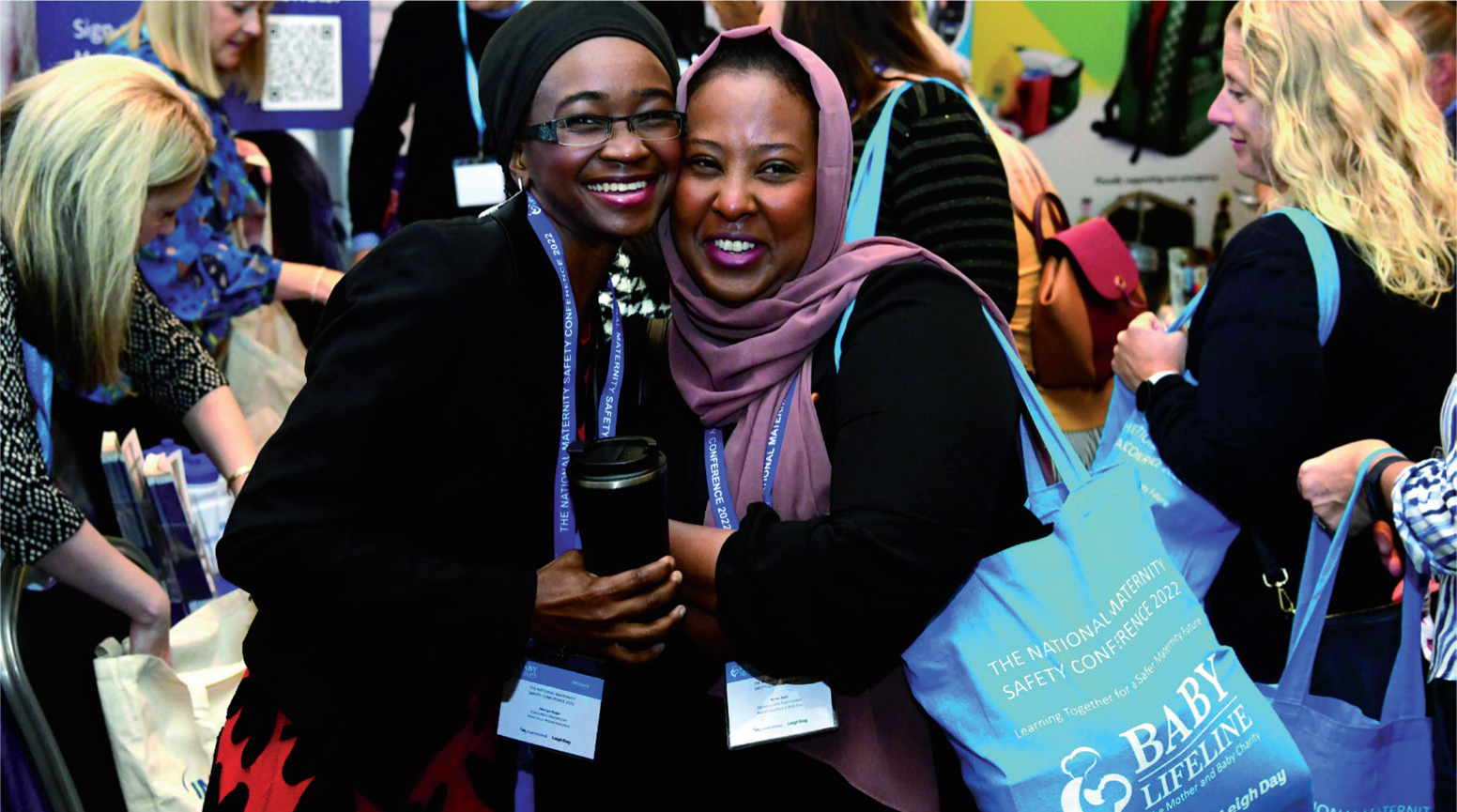Baby Lifeline was founded by Judy Ledger following the tragic loss of her first three babies who were all sadly born too small to survive. For over four decades, the charity has supported and worked with NHS professionals at the heart of care: buying equipment, developing and providing critical training, conducting research and lobbying for change. Now recognised as one of the UK's leading mother and newborn baby charities, the impact of Baby Lifeline's work extends to thousands of families and healthcare professionals each year.
‘The impact of Baby Lifeline's work gives me hope that future families will receive better care and have safer births’. Sandra Igwe, advocate for Black maternal health; Baby Lifeline Family Voices Group member
Making care safer
Each day, 13 babies are stillborn or die within the first 4 weeks of life in the UK (Office for National Statistics, 2021), and every 4 days, a family is left without a mother as a result of causes relating to their pregnancy (Felker et al, 2024). Research shows that many of these mothers and babies may have had a different outcome with different care (Felker et al, 2024), and that those from disadvantaged backgrounds, people with Black and Brown skin and those that do not speak English as a first language are disproportionately impacted (Draper et al, 2023a, b; Felker et al, 2024;Kenyon et al, 2024).

There are many opportunities to improve safety in maternity services, which was starkly demonstrated by the Care Quality Commission's (CQC, 2024) national review of maternity services report; nearly two-thirds of services were rated ‘requires improvement’ or ‘inadequate’ from 2022–2024.
The roadmap to safer services is complex; however, we know from recent reports and the work that we do that there are gaps in fundamental elements of safe care (Kirkup, 2015; 2022; Ockenden, 2022; CQC, 2024):
Baby Lifeline's work: investing in safer care
Baby Lifeline focuses most of its resources on finding and providing evidence-based solutions to these challenges to improve safety for mothers, birthing people and their babies.
Impact of multi-professional training
Almost every report and investigation concerning the safety of maternity services in the UK has highlighted inadequate training as a major contributing factor towards avoidable harm and death (House of Commons Health and Social Care Committee, 2021; Ledger et al, 2021; Ockenden, 2022; Health Services Safety Investigations Body, 2023). Despite this, Baby Lifeline's Mind the Gap reports have shown that there are significant gaps in the provision of training for frontline professionals, including topics that relate to avoidable harm and death and national life-saving guidance (for example, the Saving Babies’ Lives Care Bundles) (Ledger et al, 2021). Across the three reports, the main barriers to providing training for professionals have related to resources; for example, staffing levels, funding and equipment.
Baby Lifeline believes that healthcare professionals equipped with the right skills and knowledge can offer the safest and best possible care, particularly as an increasingly complex maternity population requires more specialist care. Baby Lifeline has a long history of developing relevant, expert-led continuous professional development training for healthcare professionals, in topics related to avoidable harm and death.
In the last 5 years, Baby Lifeline's multi-professional training has been undertaken by around 15 000 maternity healthcare professionals, equivalent to roughly 50% of the total workforce. This training has impacted care, and 90% of delegates report that they have made major or minor changes to the way they work following the training.
Where Baby Lifeline has worked with individual NHS trusts and health boards to provide large-scale training programmes, there have been improvements in outcomes. We also receive feedback demonstrating a life-saving impact following courses:
‘[Our community midwives] delivered a footling breech/cord prolapse at home on Friday … one of the community midwives at the delivery … said that the study day helped her to save the baby's life, Baby is currently doing well’. Practice development midwife who arranged childbirth emergencies in the community training for her team
The impact of training goes beyond skills-based learning; investment in training the workforce is a crucial way to retain experienced professionals.
Improving safety by providing the right equipment
Having the right equipment available is vital in healthcare. In an unpublished survey of healthcare professionals working in maternity services, over two-thirds of respondents told Baby Lifeline that they had worked in units where vital equipment was either unavailable or broken when they needed it. Similarly, the CQC (2024) stated that ‘unsuitable maternity estates emerged as another key barrier to high-quality care … and, in a small number of cases, appropriate levels of potentially life-saving equipment’.
Baby Lifeline is working hard to change this: almost all maternity and neonatal services in the UK use life-saving equipment donated or developed by Baby Lifeline, and thousands of families have benefitted from new technology and innovation at a time when they needed it the most.
In recent years, Baby Lifeline has moved from purchasing to designing and distributing equipment: namely the Community Midwife Bag. There are now almost 1300 bags in use across the UK, being used in over 90% of NHS trusts in England. It is estimated that the bags will be available for use by community midwives in between 5000 and 6500 home births each year, which is up to two thirds of all home births in England (Office for National Statistics, 2024). Despite this, nearly a third of services who have Baby Lifeline home birth bags said that they needed more for their service.
Baby Lifeline believes that every pregnant woman and baby deserves safe care. There are many complicated factors to consider, but a vital step should be ensuring the essentials are there: professionals being supported with the right skills, equipment and resources.
Get involved in our work
There is still a lot more to be done. Here are a few ways you can get involved in the work that Baby Lifeline does:


